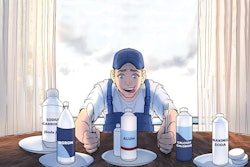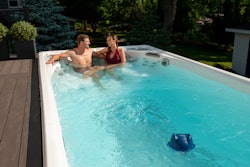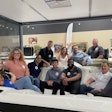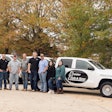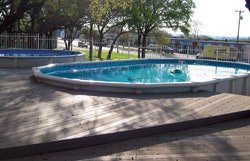
That's changed. Today, there are fewer buyers, fewer manufacturers and fewer dealers in the aboveground market.
But to say the industry and the public are ready to abandon the once-thriving segment is preposterous. We spoke with a distributor in the Northeast who said product improvements and advertising are helping his dealers. A dealer in the Midwest told us that while sales have slowed, he's still selling them by the hundreds. And a dealer in Texas has found a good niche in selling and building (sounds more professional than "installing," doesn't it?) high-end abovegrounds.
Texas Turnaround
Patrick Walsh is president of The Above Ground Pool & Spa Company in San Antonio. He admits the market is slumping nationwide, and that its fortunes were souring even before last fall when the domestic economy ground to a halt. But he's far from despairing. In fact, he's downright optimistic, economy be damned.
"We've had several discussions about how the downturn has affected us here," he says. "Of course, we always slow down in September, October and November of any year, and that's when [the recession] really hit the news. So we saw a drop-off all winter long, but there are such small numbers to begin with because business is so slow during those months anyway that it was hard to gauge.
"So we weren't sure what to think until March rolled around, and then sales actually picked up."
Walsh says he's roughly where he was last year, which, considering how some competitors are faring, is nothing short of remarkable.
He says he owes part of his recent success to the higher end of the market his company stakes claim to, but in the end it comes down to customers deciding they're finally ready to spend money they've been sitting on. He shifts the conversation to spas to underscore this point.
"Normally, we have 10 or 12 portable spas on the showroom floor, and we had let that dwindle down to four. And I wasn't reordering, and people really weren't coming in much over the winter, and we though we might just let that lay down for eight months, a year, and see how this thing plays out," he explains. "Then, all of a sudden, you know, four or five people came in and bought $8,000 spas. Things started to pick up and we went back to reordering and things just marched on."
Not all San Antonio pool stores are marching in step with The Above Ground Pool & Spa Company; some of Walsh's competition is struggling to stay standing, and the ones who are focused on the lower end of the price continuum are struggling the most, Walsh says.
"Our average ticket is probably somewhere in the neighborhood of $5,500 or $6,000, where our competitors' average ticket is probably $3,000," he explains. "So while they still might be having struggles in the lower end, we're getting a lot of the business from people that can't get financing for inground pools. They can't get the home-improvement money for the $35,000 inground pool, but they can buy a $6,000 pool on their credit card."
So in a way, the rotten economy has actually helped you sell more aboveground pools?
"Seems that way to me," he says.
Storm Clouds Over New England
For a look at the aboveground market in the Northeast, traditionally a hotbed for the product, AQUA spoke with Pravin Shah, president of Accu-Care Supply, a distributor in Rumford, R.I., that sells into the New England states.
He says many of his customers are struggling to sell pools, and that sales for 2009 are running about 25 percent below the previous year, which was soft to begin with.
"I don't think the economy has been that big of a factor," he says. "This May was rainy and cloudy and cool. That was the main factor.
"The economy does affect us a little, but maybe only 5 percent, 10 percent. And that's not just the pool, but everything connected to it - chemicals, supplies and everything that goes along with it."
The root of the troubles his dealers face goes beyond the effect of storm clouds, figurative and literal, Shah says.
"The trend was downward before the economy went south, and that's partly, I think, due to the influx of these inflatable pools," he explains. "Consumers said, 'Hey, maybe for $300 or $500 I'll put up a pool for my young kids. Four of five years from now I'll do something different.'"
His assessment contains a bit of good news, echoing the familiar refrain that today's inflatable pool customer could be tomorrow's aboveground buyer. For that to happen, though, dealers and manufacturers have to convince the pool-buying public that they offer a product that's far superior to what one finds on the shelf at the mass merchants.
"The [aboveground] product has improved a lot, both on the construction end and the long-term stability of the pools.
"Marketing and advertising to those strengths helps everybody. And it brings customers out to the retail stores.
"For the dealers who are doing well, it's got a lot to do with those marketing strategies and with lowering margins to accommodate things."
In addition, Shah says, some dealers have had success pushing smaller pools that fit smaller budgets.
"Last year we sold 30-foot and 27-foot round pools," he says. "This year it's 15s, 18s and 21s."
Middle America
To get a view of the market in the Midwest, we called Max West, vice president of AQUA 100 Hall of Fame retailer Eastgate Pools & Spas in Cincinnati. His store sells several hundred aboveground pools a year to customers in northern Kentucky, southeast Indiana and Greater Cincinnati, a good-sized market of around 3 million people.
Like Shah, the first thing West mentioned about the market for abovegrounds wasn't the economy.
"We've had lousy weather in the Midwest," he says. "And it seems like we say that every year, don't we? 'Oh, it's rainy and cold!' But it is rainy and cold."
And, like Walsh, he says it's his higher-end abovegrounds that are moving, not the low-priced models.
"We have two programs," he says. "We have what we call a cash-and-carry program, and there are certain models for customers that come in and buy them, take them home and put them in. We don't make much money on them. But historically, that's been about half our business.
"That part of the aboveground market this year is, I don't want to say 'gone,' but it's way off - probably 50 or 60 percent.
"That's a program that's always been directed toward people who have a little less liquid income to spend on a pool. And I think that segment of our economy is really, really hurting. They're not buying at all."
The other end of Eastgate's pricing structure is again split into two categories, with customers steered in one or the other direction, depending on budget. The "economy" package has a pool that's an upgrade over the cash-and-carry model, and the upper-end package. Guess which one is doing better?
"With the upper-end pools and pool packages, I think we're drawing off of what would have been inground customers in the past who may not have the money now for the $20,000 or $30,000 it takes for an inground pool.
"So our upper end has done pretty well. One model line we've sold completely out of and two others we're pretty low on.
"But our warehouse is absolutely loaded with our low-end selling point."
With the lower end's weakness being offset by the relative strength of the higher end, West figures he'll approach the sales figures Eastgate hit last year, but expects things will be off a little when a final tally is made. Going forward, however, he sees challenges.
"We're what Major League Baseball would call a small-market city, and I think we've already got a pretty good saturation of people with aboveground pools here.
"We're also finding that it's not just the high-end home associations that say you can't put an aboveground pool in, but the midmarket home associations are making rules against them, too. So there's quite a few places you simply cannot build them anymore."
Despite these obstacles, West expects things will be better in a year or two.
"That's just history," he says. "When the economy turns around there are going to be a lot of people that have been waiting to spend money, and we're going to be very happy to see them walk through our doors."
Comments or thoughts on this article? Please e-mail [email protected].






















